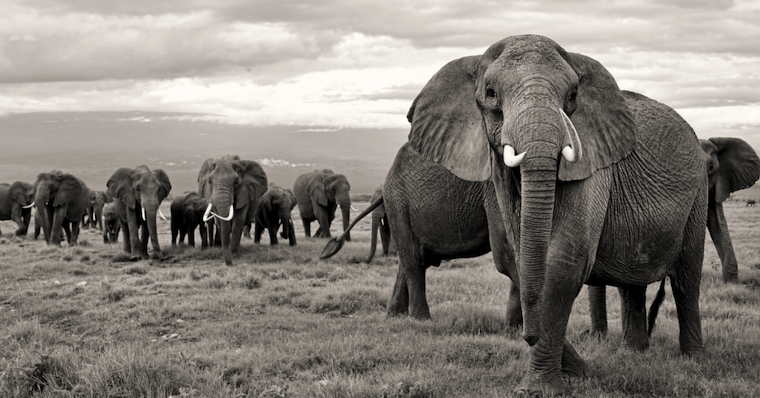
Once a refuge for elephants, Botswana rescinds ban on hunting
An Animal Rights Article from All-Creatures.org
FROM
FriendsOfAnimals.org
November 2019
At a time when tourism rates are rising in Botswana from visitors who appreciate its wildlife, the country with the largest elephant population in the world has made the shameful decision to rescind a ban on trophy hunting the pachyderms.

African Elephants...
At a time when tourism rates are rising in Botswana from visitors who
appreciate its wildlife, the country with the largest elephant population in
the world has made the shameful decision to rescind a ban on trophy hunting
the pachyderms.
African elephants have been in steep decline, facing challenges from climate
change, habitat loss and poaching. The population of pachyderms has declined
by 90 percent in the past century, with only 350,000 elephants remaining in
Africa. Their range has been drastically reduced by drought conditions.
In 2014, then Botswana President Ian Khama banned trophy hunting, citing
wildlife declines. But current Botswana President Mokgweetsi Masisi
announced the country will allow up to 400 licenses for elephant hunts. (In
fact, a committee he formed to look into lifting the ban actually suggested
using elephant meat for dog food.)
While Botswana claims more than 100,000 elephants, and southern African
nations have stable populations, it’s difficult to pinpoint populations
because more than 200,000 migrate freely between Botswana, Zambia, Zimbabwe,
Namibia and Angola, the Smithsonian noted in an article on the issue.
The decision to lift the ban runs counter to evidence that wildlife watching
brings in much more revenue than trophy hunting. World Bank tourism
development director Wouter Schalken told NPR that there is “definitely more
employment created through photographic safaris” than trophy hunting. The
number of tourists in the country increased from 367,000 in 2012 (before the
ban) to 502,000 in 2017, which includes 45,977 Americans.
While hunters like to peddle the perspective that they are conservation
heroes, and that the money they spend on killing elephants helps preserve
them, studies have shown that less than 3 percent actually end up back in
local communities. And the very act of killing elephants and bringing home
their body parts as trophies just fuels poaching by creating a market for
the animals.
“These elephants should be protected under the strictest regulations banning
hunts. Short of that, the best way to stop Botswana from allowing the trophy
hunting is to hit them where it hurts and boycott any tourism of the
country,’’ FoA President Priscilla Feral said. “Use your money instead to
visit countries that value their wildlife.”
Return to Animal Rights Articles








